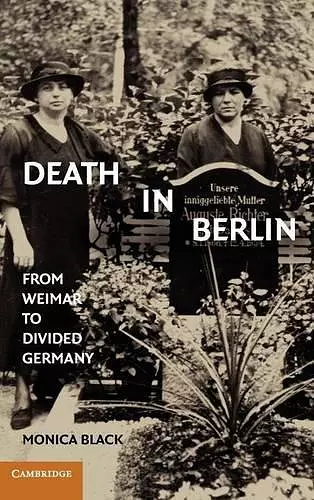Death in Berlin
From Weimar to Divided Germany
Format:Hardback
Publisher:Cambridge University Press
Published:10th May '10
Currently unavailable, and unfortunately no date known when it will be back
This hardback is available in another edition too:
- Paperback£26.99(9781107696310)

Death in Berlin traces rituals and perceptions surrounding death from the Weimar Republic to the building of the Berlin Wall.
Death in Berlin traces the rituals, practices, perceptions, and sensibilities surrounding death over the decades between Germany's defeat in World War I and the construction of the Berlin Wall.We tend to think of death as a basic and immutable fact of life. Yet death, too, has a history. Death in Berlin traces the rituals, practices, perceptions, and sensibilities surrounding death in the context of Berlin's multiple transformations over the decades between Germany's defeat in World War I and the construction of the Berlin Wall. Evocatively illustrated and drawing on a rich collection of sources, Monica Black reveals the centrality of death to the evolving moral and social life of one metropolitan community. In doing so, she connects the intimacies of everyday life and death to events on the grand historical stage that changed the lives of millions - all in a city that stood at the center of some of the twentieth century's most transformative events.
'This is a first-rate and pioneering account of how Germany's 'culture of death' served as a charged intersection of the personal and political in the middle decades of the last century.' Paul Betts, University of Sussex
'With great originality and alertness to detail and perspective, Monica Black explores how the dead were buried in a twentieth-century lifetime of mass murder. This is a history in which millions of dead cast a long shadow interrupted by dictatorship, repression, and defiance. It is a ghost story, about the persistent return of the dead in the imagined communities of bereaved, humiliated, and shamed Berliners. It is an artful perspective on the local, national, and mythic histories that make up modern life.' Peter Fritzsche, author of Life and Death in the Third Reich
'This powerful, haunting, ethically acute book puts at its center the primal topics of contamination and violated taboo, fantasies of heroic sacrifice and euphoria in the face of mortality, unrelieved grief, shattered faith, and dread of existential meaninglessness. Death in Berlin is a highly original, continually revelatory history of moral values and their malleability.' Dagmar Herzog, City University of New York
'With the sensitivity of an anthropologist and the poignancy of a cultural historian, Monica Black probes the personal and social meanings of death. Beautifully written - by turns revealing, moving, and startling - this is a magnificent scholarly achievement.' Nicholas Stargardt, Oxford University
'This is … a remarkable book that alters our perspective on twentieth-century German history … Black's book has overall significance for how we understand Weimar, the Third Reich, and Cold War divided Germany … In this wide-ranging survey Black paints death as a rich tapestry.' Mark Fenemore, German History
'In this absorbing study, death becomes a social institution unto itself. By including the dead in the history of Germany, Black provides a compelling history of the living.' Benita Blessing, Central European History
'Death in Berlin is a remarkable piece of scholarship that serves as a model of everyday life history, reminding us that a story 'that resists being told' is often one that has much to say … [it] is beautifully written in a style that is as poignant as it is academically rigorous.' Pamela Swett, Journal of Modern History
'The history that Black outlines [in Death in Berlin] is … one in which much changed, but in which all sorts of surprising continuities also operated, continuities that demonstrate anew that the history of cultural practices cannot be reduced to expressions of politics but rather have a life and rhythm of their own. [This] exceptional book stimulates many fascinating thoughts and questions and deserves a wide readership.' Neil Gregor, American Historical Review
- Winner of Fraenkel Prize in Contemporary History (Category B), The Wiener Library 2010
- Winner of Hans Rosenberg Book Prize, Organization of Central European Historians 2011
ISBN: 9780521118514
Dimensions: 229mm x 152mm x 22mm
Weight: 650g
326 pages